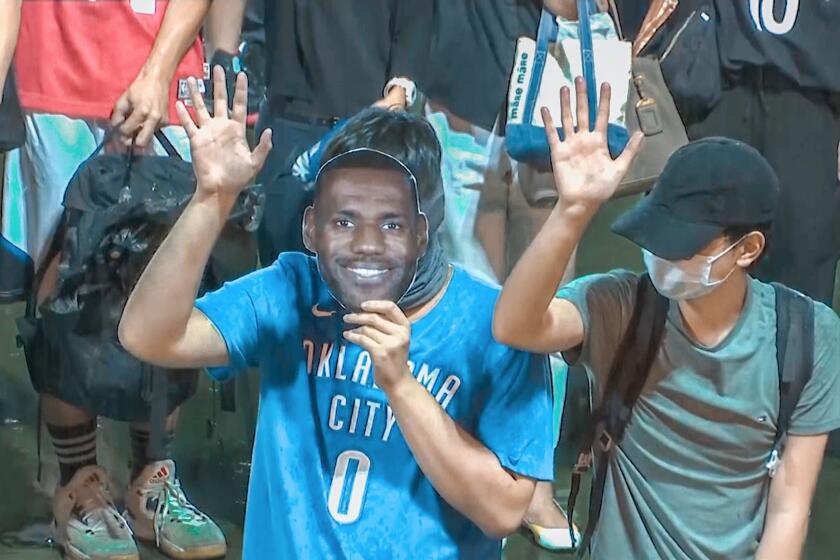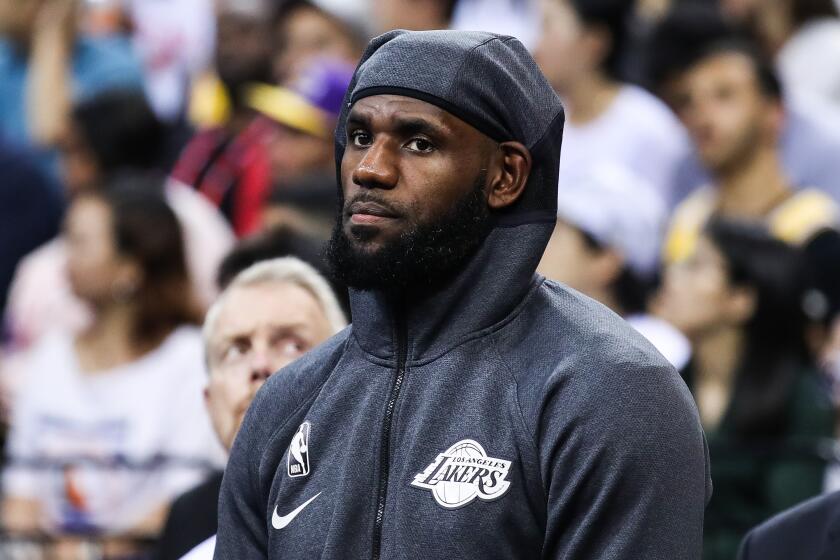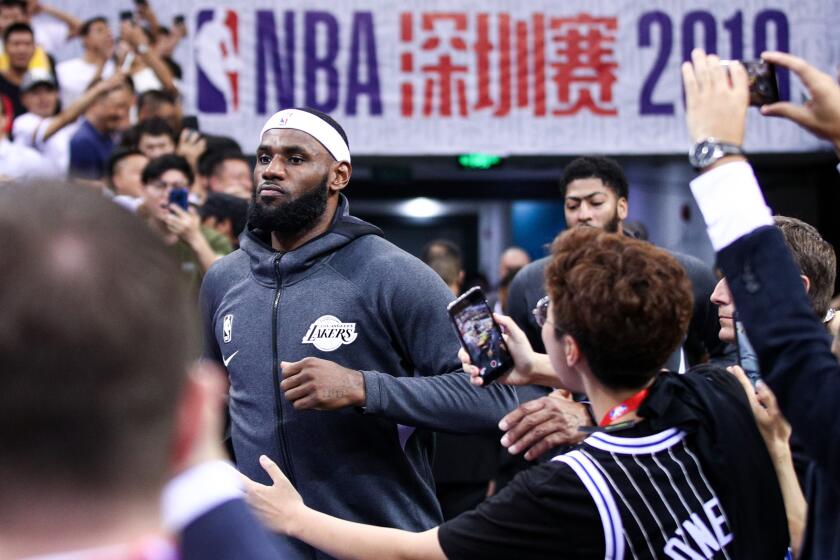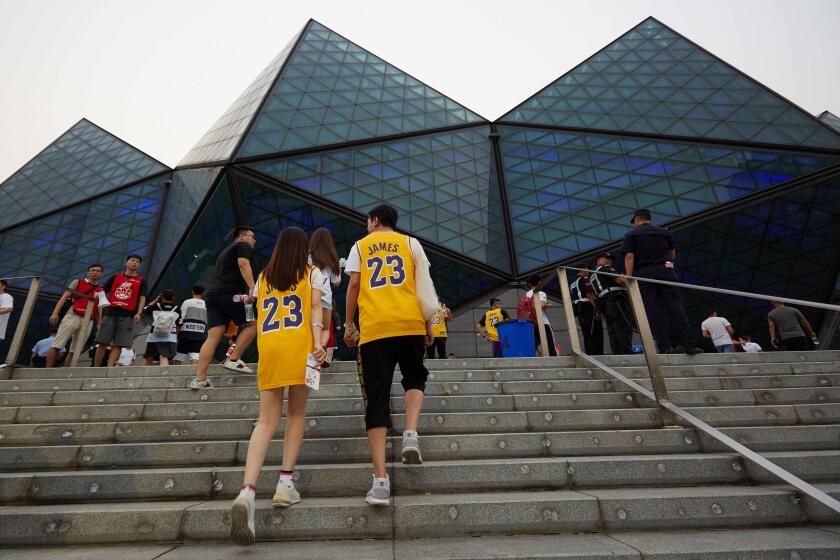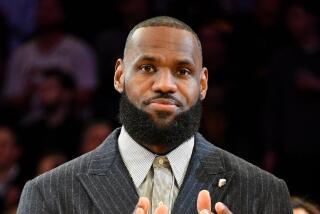Column: For LeBron James, injustice anywhere is a threat to justice everywhere … except in China
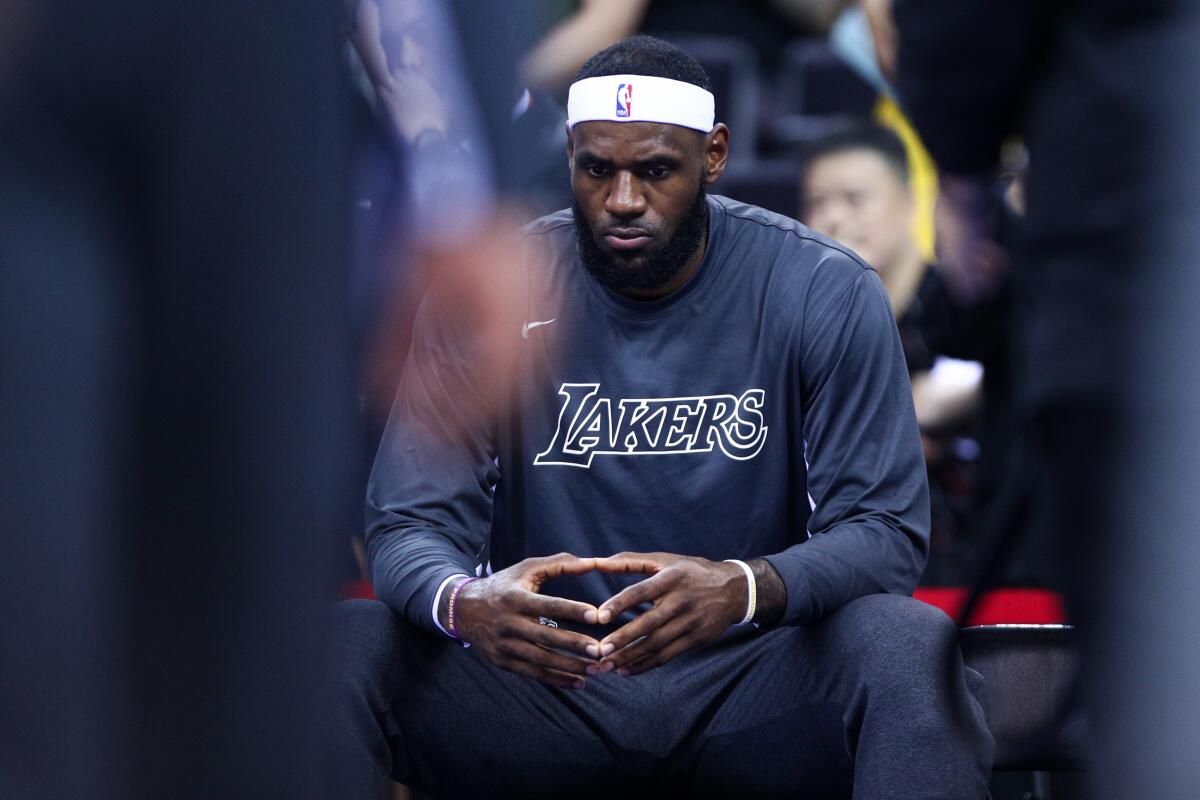
- Share via
The tweet from LeBron James was powerful, poignant and seemingly beyond all debate.
“Injustice anywhere is a threat to justice everywhere,” he wrote on Jan. 15, 2018, quoting Martin Luther King Jr. on his holiday. “Our lives begin to end the day we become silent about things that matter.”
Yet on Monday, James gave the tweet a little tweak.
In tapping his inner mercenary, James revealed that even the sports world’s leading social equality warrior has his limits.
Sure, he said, injustice anywhere is a threat to justice everywhere … except in China, because that’s where he sells truckloads of jerseys and shoes.
Fine, he said, our lives begin to end the day we become silent about things that matter … except if those things can stop those checks flowing in from China, in which case, shut up!
LeBron James’ standing among basketball fans in Hong Kong takes a hit because of comments the NBA star made about free speech.
He didn’t exactly use those words, but his meaning was clear during a pregame media session before a Lakers exhibition game when he criticized Houston Rockets general manager Daryl Morey for a tweet that upset the Chinese government and brought the cowering NBA to its knees.
On Oct. 4, Morey tweeted: “Fight for Freedom. Stand with Hong Kong.”
Morey was referring to the increasingly violent pro-democracy protests against the restrictive Chinese government that have taken place in semi-autonomous Hong Kong since June. The region’s freedom from total Chinese control, which is guaranteed until 2047, is slowly eroding every day, and its citizens are fighting to maintain some semblance of independence.
The Chinese government hated Morey’s tweet, which had an immediate effect on the NBA wallet. Chinese businesses pulled lucrative NBA sponsorships, stopped televising NBA preseason games, and basically turned a cold shoulder to last week’s visiting Lakers and Brooklyn Nets.
Then, on Monday, James joined the Chinese chorus.
Lakers star LeBron James is blaming Houston Rockets general manager Daryl Morey for hurting the NBA’s lucrative relationship with China.
“I don’t want to get into a [verbal] feud with Daryl Morey, but I believe he wasn’t educated on the situation at hand, and he spoke,” James told reporters.
Morey wasn’t educated on what exactly? Was James really calling him ignorant for supporting those fighting against the slow invasion of oppression? Or, really, was he saying Morey wasn’t educated on how much money James and other NBA players and teams were losing by alienating the world’s largest basketball market?
“So many people could have been harmed not only financially, physically, emotionally, spiritually,” James said of the tweet’s effect. “Yes, we do have freedom of speech, but there can be a lot of negative that comes with that, too.”
Note that in his list of “harms,” James begins with “financially.”
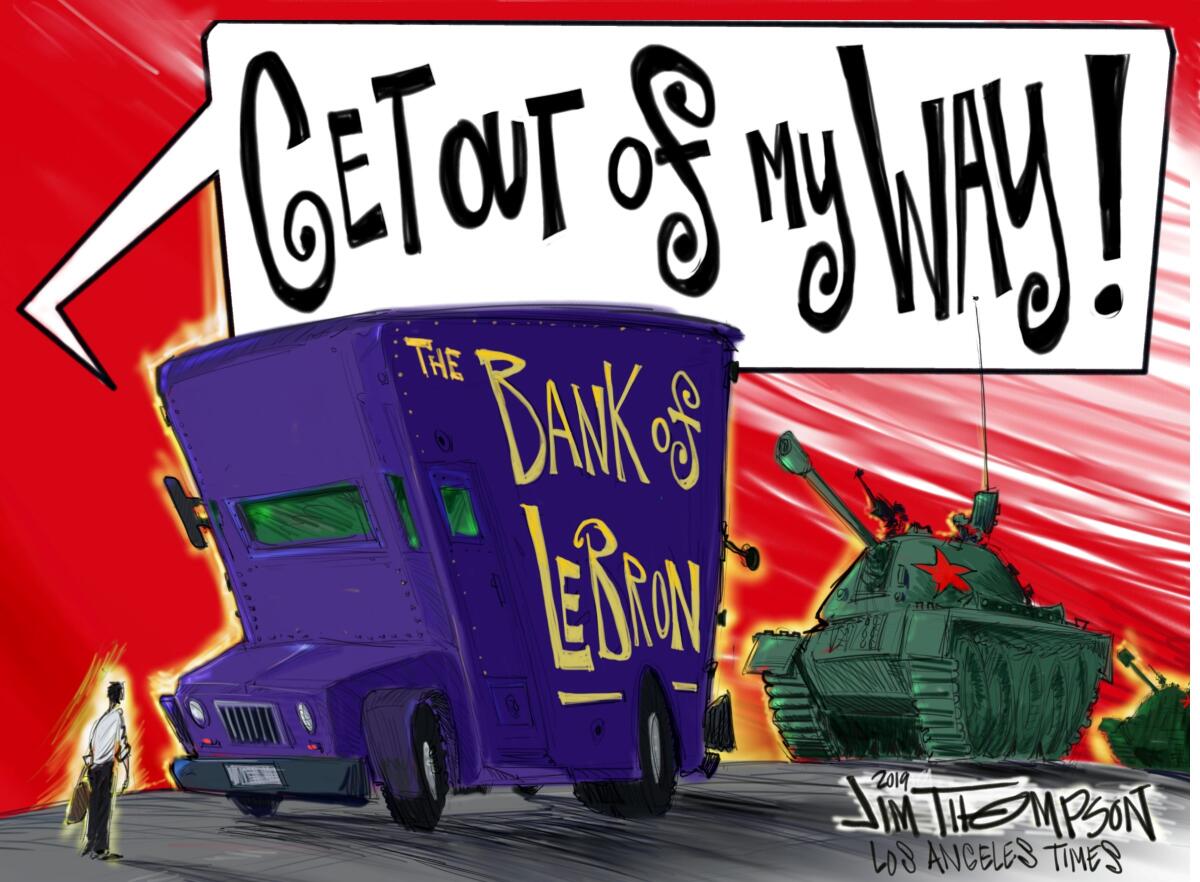
Also note the idea of him bowing at the altar of the almighty Chinese yuan by saying freedom of speech can “be a lot of negative.”
This is the same LeBron James who in recent years has become a national icon by freely speaking out against everything from racial inequality to police violence to racist remarks by President Trump? This is the same social leader who drew nationwide support when his free speech led an ignorant TV host to admonish him to “shut up and dribble?”
Doesn’t it seem like James just told Daryl Morey to shut up and run a basketball team?
The gross hypocrisy of James’ spoken comments Monday caused such a social media stir, he later tweeted out a clarification in which he claimed he wasn’t ripping Morey’s actual words, just his … timing?
“I do not believe there was any consideration for the consequences and ramifications of the tweet. I’m not discussing the substance,” James tweeted, later adding, “I think people need to understand what a tweet or statement can do to others. And I believe nobody stopped and considered what would happen. Could have waited a week to send it.”
Oh yes, of course, if Morey waits a week, then James and the NBA are allowed to fully market themselves to those millions of Chinese fans without rebuke or reprisal. If Morey waits a week, the Lakers and Nets can fly in, sell themselves down to their last shoelaces, then fly back home where they would find it easy to support Morey’s tweet with pockets bulging.
So freedom of speech is OK as long as it doesn’t inconvenience anyone? Yet back in 2012, on the afternoon of a game, James orchestrated one of his most powerful demonstrations when he and his Miami Heat teammates posed for a picture wearing hooded sweatshirts with heads bowed and faces hidden to protest the killing of teen Trayvon Martin.
The Lakers’ preseason trip to China turned out to be a politically fueled affair that required plenty of behind-the-scenes maneuvering by the Lakers and the NBA.
It was compelling, it was chilling, it was one of the most important moments of James’ career, and it didn’t matter that it took place just hours before the Heat tipped off against the Detroit Pistons. James has never championed for social justice by a clock or calendar, yet Morey should have waited a week?
To be fair, James isn’t the only one who’s been acting like a Chinese footstool. At the sight of the first Beijing frown, the NBA quickly rolled over and begged for forgiveness.
Morey deleted the tweet and modified his comments. Commissioner Adam Silver issued a public love note to China that sounded so much like an apology, American lawmakers criticized him for it. The NBA allowed the Chinese to not only cancel all media availability with the Lakers and Nets, but even cancel Silver’s news conference, selling out not just their values, but their actual freedom of speech. Think about that message. Even when the politically tinged Olympics were held in Beijing in 2008, the athletes were not silenced.
By treating the Chinese government like its most influential owner, the NBA was shameful in ways that betrayed the league’s well-earned image of inclusion and tolerance and social awareness. Once the Chinese began to take punitive actions, Silver should have ordered the Lakers and Nets to immediately return home without ever playing a game there. The decision to allow them to essentially become pawns in a showcase of Chinese indignation felt, well, uneducated.
When athletes speak out on domestic issues of which they have first hand knowledge, such as an unjust criminal justice system, our government officials want them to stick to sports. So why do those same officials want to attack them for not speaking out on the protests in Hong Kong?
We were reminded that, for all the wonderful ways the NBA deals with social progress, the NBA is still just a business.
And, let’s be real, LeBron James is first and foremost a businessman. That’s not a bad thing. He’s a darn good businessman. He’s a future billionaire mogul who has a powerful social conscience that he often uses to make the world a better place. But at the end of the day, he’s all businessman. It was business, not basketball, that brought him to the Lakers. And it is business that led him to publicly question the education of a man who simply issued a seven-word tweet in support of the fight for human rights.
James has long been considered above any of the barbs long directed at the likes of Michael Jordan and Tiger Woods, who were criticized during the height of their careers for remaining quiet on social issues to protect their economic interests.
Yet at least in one aspect of this incident, James is behaving exactly like Jordan, whose infamous alleged quote was resurrected Monday with a slight change in wording to fit the priorities of a tarnished king.
Chinese buy shoes, too.
More to Read
All things Lakers, all the time.
Get all the Lakers news you need in Dan Woike's weekly newsletter.
You may occasionally receive promotional content from the Los Angeles Times.

